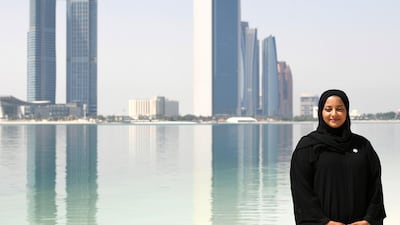When one door closes, another one opens.
It is all too easy to dismiss this time-worn adage, but for conservationist Hind Al Ameri it rings true.
Ms Al Ameri was studying landscape architecture at the University of Leeds, in the UK, when she was told the course was being withdrawn due to lack of demand.
It was a moment in which the landscape changed forever for the 27-year-old Emirati.
Instead she decided to take up a bachelors degree in environment science, and hasn't looked back since.
For her, the "next best thing" became the best thing of all.
After completing her degree she secured a job with Environment Agency Abu Dhabi, where she has been fighting the eco cause for five years.
Little did she know the strong bond she would soon build with the plight of sea turtles, that face a constant fight for survival in oceans increasingly decimated by plastic waste.
“I have always wanted to give back and do good, and the EAAD helps me to do that,” she said.
“I fell into environmental work when I was doing my bachelors degree in landscape architecture.
“Unfortunately the university had to close the course as there was not much demand, so the next best thing was environmental science.
“I fell into it by chance. Sometime things change for the better.”
Ms Al Ameri has always had an environmental conscience, and a love of nature.
That has driven her towards a career she is passionate about.
Depending on the season, her work may involve conducting aerial surveys to check on the movements of dugongs, another vulnerable species found off the Abu Dhabi coastline.
Other days, the environmentalist could be checking up on nesting turtles and more surveys during hatching season.
Although not yet a qualified diver, a chance to get up close to turtles in the open ocean is offered during tagging exercises to monitor the animals movements at sea.
Ms Al Ameri is splitting her time working with the EAAD’s marine assessment and conservation team with a distance learning course at Exeter University in the UK.
There she is completing a PhD in marine studies and is researching turtles of the UAE.
Rarely does a day pass without another grim story about the widespread use of single use plastic, clogging up waterways and oceans around the world.
Like many marine animals, turtles mistake discarded plastic bags for jellyfish - a staple diet for many ocean wildlife.
“It is what I have always wanted to do, but have been attracted to the work and research into turtle conservation,” she said.
“I knew turtles were threatened, but I did not know about their biology or how to protect them.
“When I was searching for somewhere to do my PhD, I wanted to focus on marine turtles in Abu Dhabi and I found this renowned specialist Professor Brendan Godley at the University of Exeter.
“He had been working with marine turtles all over the world since 1991, so I am really lucky to be working with him.”
A six-month review at Exeter University will monitor her progress, so she has regular trips to the UK.
Students studying similar turtle research work together on the course, to compare findings and trends around the world.
One colleague is looking at the impact of micro plastics on turtles, with analysis on the gut content revealing all those checked in a recent study had traces of plastic in their stomachs.
“These turtles were from all over the world, so it shows how widespread the problem is,” she said
“I can see people are more aware of the environment here now than a few years ago, so there are improvements.
“People are beginning to move away from single use plastics but it is a lot of work.
“We are trying to help change things at the EAAD.
“I’ve done some tagging of the green turtles and they are amazing to see so it is important they are protected for future generations to enjoy”


